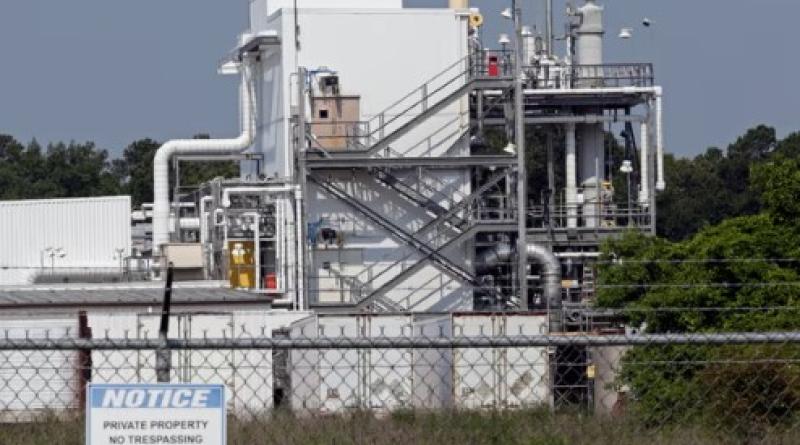Backlash forces EPA to pause toxic PFAS waste imports to US from Netherlands

The federal US government has paused the importation of millions of pounds of toxic PFAS “forever chemical” waste from the Netherlands following intense backlash from residents near a North Carolina facility that would receive the substances.
Local media last month revealed the Environmental Protection Agency had quietly approved a permit for chemical manufacturer Chemours to import about 4m lbs of waste over the next year, sparking fears of further pollution in a region already thoroughly contaminated by the company’s operations.
The increased amount of PFAS waste processed locally would be “devastating”, said Emily Donovan, co-founder of the Clean Cape Fear non-profit.
“We are tired of being a PFAS sacrifice zone and watching our friends suffer and die,” Donovan said.
PFAS, or per- and polyfluoroalkyl substances, are a class of about 15,000 compounds most frequently used to make products water-, stain- and grease-resistant. They have been linked to cancer, birth defects, decreased immunity, high cholesterol, kidney disease and a range of other serious health problems. They are dubbed “forever chemicals” because most do not degrade in the environment.
Chemours, which was spun off from DuPont in 2015 to shield the latter from legal liability, is thought to be responsible for contaminating the air, soil, crops and water across hundreds of square miles in south-east North Carolina with PFAS. Many residents allege it has sickened and killed people on a wide scale, and the United Nations is investigating human rights violations over the company’s pollution.
A 2019 state consent order required the company to rein in Fayetteville Works’ pollution, but the EPA still in September signed off on as much as 100 shipments from Chemours’ Dordrecht facility to Fayetteville via the Port of Wilmington, an agency document shows.
Chemours would recycle or reuse waste for one kind of PFAS compound, HFPO-dimer acid, commonly called GenX, which is highly toxic at low levels of exposure. It is unclear if that process will lead to more emissions and environmental contamination at the Fayetteville facility.
Local residents and public health advocates were “blindsided” by the news, Donovan said.
“That’s what we’re really concerned about – this decision was created in a vacuum of transparency,” she said. “Where was the communication to the impacted communities that have been engaged on this topic?”
North Carolina’s governor, Roy Cooper, also said his administration was unaware of the new permit, and in early November sent a letter to the EPA urging it to reverse its permit approval.
“It was with dismay that we learned that EPA recently approved the importation,” Cooper wrote.
The EPA said it implemented a pause “In response to recent concerns expressed by stakeholders including the state of North Carolina” and local residents.
In 2018, the Trump EPA ordered Chemours to halt shipments because of questions over the waste’s handling and outdated data. The company had started shipping about 10 metric tons of waste in 2014, and that grew to about 250 metric tons by 2018.
Some of the substance was also being sent to deep well injection facilities, where toxic waste is stored far into the earth’s crust. The wells are prone to leaking and contaminating groundwater, and it’s unclear if the new PFAS shipments will all be reused, or if some will be disposed of in wells.
From 2014 until at least 2017, some of the Dordrecht waste was sent to an Italian facility, but it contaminated groundwater and authorities in the region suspended some of the company’s operations.
It is unclear why the EPA changed positions and approved the permit, but it told the Dutch media outlet ITL Chemours had “provided confidential business information that supported providing the conditional consent”.
The waste cannot be disposed of in the Netherlands because the country has in place stricter GenX regulations, and has designated it as a hazardous substance. The US federal government is considering whether to designate GenX as a hazardous substance through several channels, but the process has stalled, Donovan said.
The letter states none of the substances being imported are hazardous waste, she added, which is frustrating local residents because the EPA has been slow in the designation process.
“They’re going to create a problem and let it fester,” she said.
A Chemours spokesperson told the Fayetteville Observer the US plant was authorized to receive up to 4m lbs of waste, but the company will probably import far less.
“Chemours’ Fayetteville Works has emissions control technologies in place to abate emissions of fluorinated compounds in accordance with our operating permits and levels contained in the consent order,” the spokesperson said.
But Donovan said it was unreasonable to allow more waste to be imported to a plant that still has yet to clean up the pollution in its backyard.
“We haven’t begun to see nearly the amount of cleanup and recovery that we know we deserve for the scope of contamination crisis here, but now the EPA is going to allow this massive amount of GenX waste to be imported?” she said.
Photograph: Gerry Broome/AP





